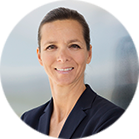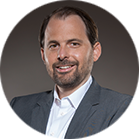On 14 August, a ten-member jury will select five start-ups to travel to Silicon Valley with Swisscom and Venturelab for a one-week business accelerator programme. New to the jury line up: Carole Ackermann, CEO and co-founder of the investment company DiamondScull AG, and Lukas Weder, co-founder of EAT.ch and business angel. We had the opportunity to ask them a few questions.
New jury member Dr Carole Ackermann
 Dr Carole Ackermann is CEO and co-founder of the private investment company DiamondScull AG, which invests in start-ups in medicine, high-tech and IT. She has more than twenty years of international and intercultural leadership experience in managing SMEs and large enterprises. Carole Ackermann completed her studies in economics and business administration at the University of St. Gallen, where she has worked as a lecturer for business economics and integration projects since 2003.
Dr Carole Ackermann is CEO and co-founder of the private investment company DiamondScull AG, which invests in start-ups in medicine, high-tech and IT. She has more than twenty years of international and intercultural leadership experience in managing SMEs and large enterprises. Carole Ackermann completed her studies in economics and business administration at the University of St. Gallen, where she has worked as a lecturer for business economics and integration projects since 2003.
Carole and Lukas, you have been active in the start-up scene for several years now. What kinds of changes have you noticed in recent years? Have you identified any future trends?
Carole: We’ve been receiving about the same amount of applications for financing at Business Angels Switzerland (BAS) for the last ten years – so not much has changed in terms of numbers. For years, we have mainly received applications from start-ups in an early stage, which means for their first external financing. My experience shows that early-stage financing has gained in recognition in general. A multitude of angel associations now exist, whereas only a few players were active on the market before. Now investors know each other, while major banks provide platforms and tools and also organise events to inform their clients about early-stage financing. Moreover, an increasing number of large enterprises are collaborating with start-ups to make sure they don’t miss out on new developments or opportunities. One aspect that has certainly changed in recent years is the industry focus. We used to receive requests from the consumer goods or classic industry sectors, but now the start-ups are more likely to be in fintech, IT or eHealth. In future, I expect to see Swiss start-ups looking to establish contact with other countries more often and earlier on. I have already noticed that many start-ups would like to become familiar with and capture foreign markets as quickly as possible. Lukas: Founding a start-up or working at a start-up has become a common way for a lot of students to start their careers. In general, the subject of entrepreneurship and start-ups has received more public attention in recent years. Now the first generation of start-up founders, which I belong to, is supporting the new, second generation of founders. I sincerely hope that the transfer of knowledge to the next generation will happen on an even greater scale. That transfer of knowledge has become one of the key success factors for start-ups in other countries.
Carole, you are a member of the StartUp Challenge jury for the first time this year – what do you expect from the start-ups that will be pitching on the final day?
With this challenge, Swisscom is offering start-ups a terrific programme. In return, I expect the start-ups to have prepared for their pitch and trip to Silicon Valley with the same level of professionalism. Like everything in life – it’s a matter of give and take, and I’m convinced that the more you give here, the more you get back.
How can the ten finalists win you over? What do you pay specific attention to when selecting the winners?
Lukas: In general, I support start-ups with an exceptional team of founders in which you can sense their passion for their own company. I particularly like to see start-ups that already have initial clients and so have been able to get some relevant market feedback. I would place particular emphasis on understanding your market and customers on the pitch day. Credibility and a clear, defined strategy go down well with me. I am not impressed by buzzword bingo like machine learning, AI or blockchain.
Carole: The ten finalists have already overcome several obstacles. Their business plans were scrutinised by a large jury, and were well received. That means that the idea was appealing, can ideally be patented and fulfils a customer need. It also means that the market is large enough and the business model made sense. Nonetheless, the environment rarely develops as planned, which is why the founders and team are of utmost importance. That is what I pay particular attention to. What’s decisive for me is how well a team can deal with surprises, how the team works together and the kind of staying power that they display on the day. When I look back on my failed investments, that failure was never due to the wrong idea, but was instead always due to the founders, the team and perhaps also the wrong timing.
New jury member Lukas Weder
 Lukas Weder is co-founder of the service platform EAT.ch and now acts as an investor and business angel for start-ups. He successfully sold his company EAT.ch a few years ago to the strategic investor Just Eat. As a former start-up entrepreneur, Lukas is familiar with the start-up life cycle from founding to selling. He has a master’s degree in accounting and finance from the University of St. Gallen.
Lukas Weder is co-founder of the service platform EAT.ch and now acts as an investor and business angel for start-ups. He successfully sold his company EAT.ch a few years ago to the strategic investor Just Eat. As a former start-up entrepreneur, Lukas is familiar with the start-up life cycle from founding to selling. He has a master’s degree in accounting and finance from the University of St. Gallen.
Lukas, how can a start-up get the most out of support programmes like the StartUp Challenge over the long term? As a former start-up founder, what do you think about these kinds of programmes?
Lukas: With EAT.ch, we were probably one of the few companies to never have participated in this kind of programme. Now, thanks to the diversity of offerings, you can practically participate in them non-stop. That being said, I still recommend that start-ups remain selective when choosing programmes and only participate in programmes that clearly add value to the development of their start-up. That added value may be access to experts, potential customers or investors. The Swisscom StartUp Challenge is definitely a prime example of a support programme and can help a start-up to advance in exactly these areas.
Do you have any other tips that you would like to give the winners for their trip to Silicon Valley?
Carole: I am fascinated by the confidence of the start-ups, venture capitalists and consultants in Silicon Valley: it seems to almost be diametrically opposed to our cherished Swiss humility. Everything is done according to the motto ‘Try, test, fail, but learn fast’. I would take that as an opportunity to work out which area could be the most useful to try things out and learn. What is important after returning to Switzerland is to validate everything you were able to learn. Success doesn’t necessarily have to mean making it there. Success is also seeing what is (still) not working or realising that the Silicon Valley culture is perhaps not a good fit for your company.
Lukas: I recommend that start-ups learn as much as possible about the American market while in Silicon Valley by talking with investors, potential customers or even their competition. They should also establish contacts in Silicon Valley that might open doors for them in the future and be used to establish a network in the US.
Carole, you have been an investor for ten years. What should be expected from the relationship between founders and investors?
I don’t think there’s a description that applies to everyone. What seems important to me is for both sides to explain their expectations before and during an investment. I’ve experienced different relationships with the start-ups we’ve supported. The investment might be solely financial, support in the form of my network or expertise, or it might mean taking on a mentoring role. However, the paramount goal for us when making an investment is for it to yield sustainable results that also generate financial success for us. The roles can vary over the course of an investment. Everyone has a notion of how it should be – but it can be particularly frustrating for founders if their own expectations do not correspond with those of the investor. That’s why I recommend that everyone sorts out what they expect from the relationship from the very beginning.
Lukas, you were able to successfully sell EAT.ch. When is the right point in time for a start-up to sell?
Lukas: If you are looking to sell, you should try to do so while in a strong position. You are in the strongest possible negotiating position when you have several bidders involved in the selling process. A start-up that is already profitable or can easily receive additional financing always has the option of declining a tender offer and waiting for a better one. You can find more information about company acquisition here.

